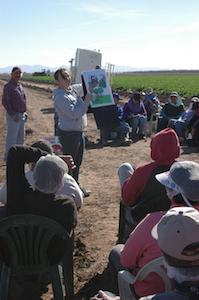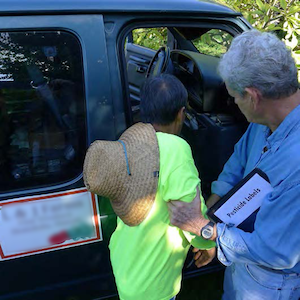If you work around the plants on an agricultural establishment where they have used pesticides in the last 30 days, a regulation called “the Worker Protection Standard (WPS)” probably applies to you. Your employer is required to provide you with information, protections, and emergency assistance. This guide is an incomplete summary of the required protections for workers, not pesticide handlers. To learn more, see the "How to Comply" manual.
These rules are intended to protect you and your family from the risks of pesticide exposure.
Your employer is required to give you information.

- Before you begin working in areas that have been treated with pesticides, you must receive training about the risks of pesticide poisoning, the symptoms, first aid, and ways to protect yourself. The training must be provided in a language/manner that you can understand. A qualified trainer must be present at the training to answer any questions you may have. This training must be provided once a year. You can request a record of your training, and take it with you to other jobs.
- Your employer must tell you where to find these things on each establishment where you work. They should be freely accessible during work hours:
- A pesticide safety poster at a central location,
- Records of pesticide applications in the last 30 days, including the dates, times, and places where pesticides were applied, and
- Safety data sheets for pesticides applied recently
- Your employer must tell you which fields or areas to avoid when entry is restricted because of recent pesticide use. They might tell you verbally at the beginning of your shift, or they might post warning signs.
- Some pesticides have a restricted-entry interval (REI) which is the amount of time after a pesticide application when people cannot enter. If you have to enter treated areas before the restricted-entry interval (REI) has expired, your employer must give you extra information and personal protective equipment.
Your employer must provide protections.
- Your employer must keep workers and others out of an area when pesticides are being applied. If the pesticide label requires a restricted-entry interval (REI), your employer must keep workers out for that period of time.
- Your employer must keep workers and others away from pesticide application equipment while pesticides are being used.
- Your employer is not allowed to have workers under age 18:
- enter treated areas early (before the REI expires)
- mix, load, or apply pesticides
- dispose of pesticides
- handle open pesticide containers unless they have been triple-rinsed
- act as a flagger during pesticide applications
- clean, handle, or repair equipment that may have pesticide residues
- help with pesticide applications
- Your employer will make sure you have enough water, soap, and single-use towels for hand-washing during your shift. That means at least 1 gallon of water per worker, within 1/4 mile of where you’re working.

Your employer is required to make sure you get help if you are exposed to pesticides and show signs and symptoms of pesticide exposure.
- Your employer must provide transportation to a medical facility.
- The location of the nearest emergency medical facility must be written on WPS Safety Poster at a central location.
- Your employer must provide your medical team with information about the situation that occurred, the pesticide(s) you were exposed to, and the pesticide Safety Data Sheet(s).
Your employer is not allowed to retaliate against you for following these rules.
- Your employer is not allowed to fire you, threaten you, or punish you in any way for following these rules.
- You may refuse to participate in activities that would violate the WPS.
- You may provide information to government authorities about WPS investigations.
- You may report WPS violations to the appropriate authorities. Look for the phone number on the WPS Safety Poster at a central location.

Your employer must provide you with documents if you ask within two years.
- You may request a record of your WPS pesticide safety training.
- You may request pesticide application information and safety data sheets. It must be provided within 15 days.
- If you would rather not ask for the records yourself, you can designate a representative, someone you trust, to request them for you. You will have to sign your name and provide your dates of employment to request this information.
You can make a difference for yourself, your co-workers, and your family.
- Learn all you can about pesticide health and safety from the training materials and safety poster. These are required to be provided to all workers.
- Prevent unnecessary exposure to pesticides.
- Recognize the symptoms of pesticide poisoning.
- Avoid taking pesticide residues home with you.
- Remember that children and pregnant women are especially sensitive to the effects of pesticides.


